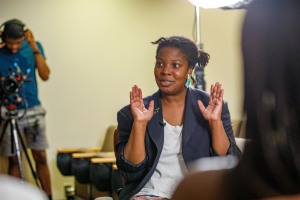Should I propose this? Should I be like this? Should I wear this? I've never had those questions since I've been at Brown. I've never had to question who I am, how I think, what I wear, how I speak. I just feel very accepted here and I feel like if there's something that I don't agree with, like I don't agree with a lot of the ways that we handled COVID, I feel like I can say that and be heard without retaliation or retribution.
I think that for the most part, wherever you are, people are afraid to be wrong. People are afraid to acknowledge mistakes and people are afraid to pivot from preconceived beliefs or prior beliefs. Brown is just a special place where I've met a community of people that aren't afraid to do those kinds of things.
So at Brown, at least, it is possible to really work with communities and be a scientist.
I had this great pivot, and ended up doing a bunch of non-academic work, releasing a lot of non-academic tools, operating a mobile tap water testing lab, creating community reports, creating workbooks, creating a summer research series where we worked with community colleges and high school students. These are not all promotable products, but at the same time, I was also able to publish in highly reputable journals, so I think you can do both. But if you're in a place where you can't do both and you want to do both, then for me, that's not your home. You have more searching to do. You have a home that's waiting for you, you just have to find it.
Moving back to Jackson: the city’s water has improved. Did your team’s presence make a difference?
I think our presence there, knowing that we were testing water, that we were educating residents about what was in their water, I think just knowing that there is an unbiased but accountable entity there really helped to make sure that they were testing, testing regularly, and informing residents. So I think we helped shift the narrative from apathy, to, 'Okay, we’ve got to do something about this.’
And we're educating people. Because, the residents are the ones who are ultimately going to have to hold their elected officials accountable.
When community residents tell us that the water administrator went on TV and told them about the status of their water to date, and that they can understand terms like turbidity or pH, and where their water comes from and the implications of boiling water, that is very rewarding.
These are things they didn't know before. So we’re giving them information, and educating them so they can take on the advocacy. Just seeing people ask you for things, and feel comfortable enough to ask you for things, has just been amazing. When I grew up in the community, we just sort of accepted what was happening around us as status quo. So even seeing people wanting to advocate for change and trusting us to be a part of that process is very amazing.
We're in a community in Mississippi now that is dealing with pollution from wood pellet plants and we have air pollution monitors and noise monitors in these communities on utility poles and things like that. And a retired woodworker made us little boxes to put the air pollution monitors in, which has cut down on time. So, just seeing people really wanting solutions for their community and wanting to play an important role in that process has just meant everything to me.
I think because we leaned in with an issue that was very important to the community at the time, they saw that we showed up, we did what we said we were going to do, and we followed through to the end and we're still there. That provided a level of trust, so residents began to become curious about other parts of our project. They began to make connections: Our water's this way. What are our noise levels like? What is our air pollution like? Is there a relationship?
So we didn't have to force them to figure out these environmental questions. They were willing to work with us to put these different pieces of the project together.
And have any ghosts been put to bed?
I'm from Jackson, Mississippi, born and raised there. So when the residents told me that they had other concerns, it sort of brought me back to my childhood when there were people that would swoop in and carry out their agendas, but would never follow through, they would never return, and our lives never changed for the better.
So when they told me that they had other priorities, I knew that that was a time for me to listen and kind of go back to that younger version of myself that always wondered, well, what is the point of all of this if it's not gonna improve our lives?
So I had an opportunity to address some ghosts of my past and for me that was important because I'm from there, my family still lives there, when I go home I still go to church there, these are my people. What they need, for me, is more important than anything that I'm doing at the moment.
